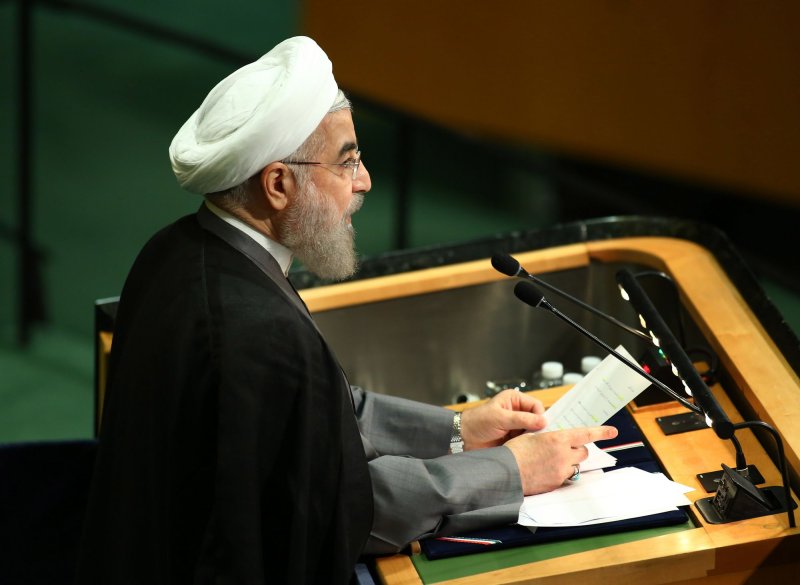Hassan Rouhani, president of Iran, addresses the United Nations in New York last month. As part of the nuclear deal with Iran, the United States agreed to waive energy-sector sanctions. Some some Democrats in Congress don't agree. Photo by Monika Graff/UPI |
License Photo
The Obama administration is breaking with a group of Senate Democrats who want to renew expiring sanctions that target Iran's energy sector, arguing that it has the muscle to apply new penalties administratively if needed.
At issue is the Iran Sanctions Act of 1996, which punishes investments in Iran's energy sector and was meant to deter Tehran's pursuit of a nuclear arsenal. Set to expire on Dec. 31, the law has been a "pivotal component of U.S. sanctions against Iran's energy sector ... since enactment in 1996," the Congressional Research Service has noted, adding that its reach has "been expanded to other Iranian industries."
But when the Obama administration and other global powers negotiated a deal with Iran to halt its nuclear program last year, the White House agreed to waive all energy-sector sanctions, pending Tehran's adherence to the pact.
[White House's Last TPP Pitch to Congress: 'What's the Alternative?']
That doesn't sit well with some of President Barack Obama's closest allies in Congress. Some Democrats are urging Senate Majority Leader Mitch McConnell to schedule votes on reauthorizing the law during the lame-duck session.
The Democratic senators, in a letter to the Kentucky Republican last week, said that renewing the law is "crucial" because "it remains a critical tool to deter and impede individuals and entities supporting Iran's development of conventional weapons and weapons of mass destruction."
Keeping it on the books would ensure "with the utmost certainty" that Washington has "the sanctions enforcement mechanism our national security demands."
The Democratic senators — Richard Blumenthal of Connecticut, Debbie Stabenow of Michigan, Jeff Merkley of Oregon, Ron Wyden of Oregon, Amy Klobuchar of Minnesota, Martin Heinrich of New Mexico and Brian Schatz of Hawaii — contend that the law enhances the nuclear pact by giving the United States an "unambiguous ability to immediately snap back sanctions in the coming years."
But the administration has other ideas, setting up a potential clash in the lame-duck session.
"Right now, we are focused on ensuring that Iran continues to fully implement its nuclear-related commitments under the [nuclear pact]," a White House official said.
"The expiration of the Iran Sanctions Act ... will not affect our ability to continue to issue sanctions designations when warranted, as we have ample authorities to target missile-related actors, as well as activity related to human rights violations, malicious cyber activity, and other activity of concern," the official said.
[The Closer: Obama Enters Campaign as Democrats Cling to Leads]
The administration has also concluded that should the law expire, it would not hinder the United States' ability to apply energy sanctions should Iran violate the deal.
"We can do everything we need to do under other authorities," the White House official said.
A vote during Obama's final weeks as president could potentially set up another battle about the legal authorities that are granted by the Constitution.
Many Republicans and Democrats, for years, have warned about Congress increasingly leaving foreign policy to the executive branch, and a debate about voting on the Iran Sanctions Act would likely include calls for lawmakers to reassert themselves.
Sen. Tim Kaine of Virginia, the Democratic vice presidential candidate, also supports reauthorizing the Iran Sanctions Act and has a bill that would do so. Senate Foreign Relations ranking Democrat Benjamin L. Cardin of Maryland, earlier this year, said a clean extension of the sanctions act had enough support to pass the Senate by unanimous consent. But if Republicans try to add new sanctions to the bill, they will face a filibuster by Senate Democrats.
Contact Bennett at [email protected]. Follow him on Twitter @BennettJohnT.
Get breaking news alerts and more from Roll Call on your iPhone or your Android.















